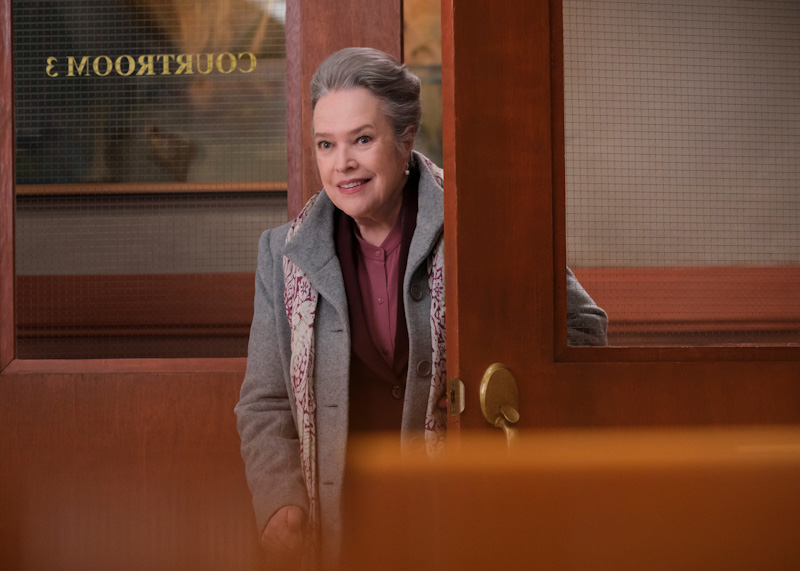Female lawyer lead in 'Matlock' on CBS shows the power of appearing powerless

Kathy Bates portrays Madeline “Matty” Matlock in the 2024 iteration of Matlock, inspired by the classic television series of the same name. (Photo from MovieStillsDB)
When I first came across the new Matlock offering staring Kathy Bates, I figured it would either be a reboot or a continuation of the original series, which starred Andy Griffith and ran from 1986 to 1995. However, the production team answered that question within the first few minutes of the pilot: 2024’s Matlock is kin to its predecessor only in name and genre. The meta explanation given for the series’ title is the first of many surprises in store for the audience.
The series premiere aired on CBS and became available on Paramount+ on Sept. 22; it will air again Oct. 10, and new episodes will start Oct. 17.
Bates’ character, Madeline “Matty” Matlock, presents as an older attorney who hasn’t practiced in more than 30 years. She wants to reenter the legal field and uses her cunning and unassuming demeanor to sneak into a a successful law firm’s partners’ meeting.
When questioned about how she made it past the security, Matlock drops a pearl of wisdom that might serve as the series’ bedrock: “There’s this funny thing that happens when women age—we become damn near invisible. … It’s useful, because nobody sees us coming.”
After this somewhat unusual job interview, she’s given a probationary period as a potential full-time associate and assigned to a civil rights case set to begin trial the next day. In classic fashion, she assists the supervising partner in some indispensable ways, proving her worth and showing she can punch above her perceived weight. As I mentioned, the pilot offers a few bombshells, with one revelation toward the conclusion that will drive the show’s story moving forward.
While a few law practice-related segments made me shake my head in disagreement, I was mostly impressed with the limited courtroom scenes. If I had to guess, the production team likely consulted with actual litigators to gain a few pointers. If not, kudos to them for a job well done.
On the morning of the trial in the wrongful conviction case, the lead attorney does a great job of narrating her plan and the theory behind some of her strategies. There’s discussion about a motion in limine she’ll urge before the trial begins; she explains that even though she knows she’ll lose the issue, it needs to be argued anyway to preserve for appeal. That might seem like a no-brainer to experienced litigators, but in my experience, many young attorneys are afraid to fight a losing battle because they miss the forest for the trees.
Likewise, the partner describes how her opening statement is the first opportunity to tell the jury her client’s story. She decides she’ll do what she can to slide in the “reasoning” behind her client not taking the stand (the main rationale is actually related to his prior criminal history). When the defense objects, she feigns surprise, despite her previous admission that, “Again, I’ll lose, but I’ll get it in the jury’s head.”
I’d never advise an attorney to conduct themselves in an unethical manner. You should address a questionable issue in limine before trial. Still, we all know there are grayer areas depending on your judge, and plenty of attorneys will ring a bell that can’t be unrung to test the waters and see how much leeway they have.
The benefits of being invisible
Matlock’s highly observant nature becomes evident throughout the episode. She picks up on little details and isn’t afraid to discuss them and try to relate. Like most good attorneys, her attention is microscopic.
Her demeanor is indicative of the initial statement made to the firm partners about being invisible. Predictably, her approach works well. After all, no opponent is more formidable than one you refuse to see—who sees everything about you.
The main reason Matlock gains probationary employment with the firm is related to information she procured about a potentially large settlement the firm is trying to negotiate. Staying true to her character’s theme, she gained the details by being both invisible and observant.
While the notion of being invisible might be challenging today due to the proliferation of cameras and social media, if nothing else, try to approach your cases in an unassuming manner. As Matlock notes, it may help you to get the benefit of surprise. And keep this adage in your back pocket: Sometimes it’s better to be seen and not heard.
Two ears and one mouth
While prepping for the fast-approaching trial, Matlock does a great job of listening to the folks she meets, and the information she learns helps separate her from the pack. When you get down to it, posturing yourself to take advantage of your adversary’s misconceptions is only half the battle. You also need to listen more than you talk.
There’s a spot-on mantra from the Greek Stoic philosopher Epictetus: “We have two ears and one mouth so that we can listen twice as much as we speak.” In all honesty, I struggle with this at times. I can get on a roll talking about something I’m passionate about, and it’s hard to shut me up. I like to think there are others who need to work on that as well.
As attorneys, we work in a world of words. It’s easy to get caught up in that reality. When we are young, we think we need to speak so that we can show what we know. When we get older, many of us have learned so much that we want to share our knowledge. Sometimes it’s tough to turn off the faucet once we’ve let the water flow.
Still, when we couple this aspect of listening more than speaking with the notion of being invisible, there’s a fear we might come off as timid. That isn’t bad if the appearance is beneficial in the moment. There are times to be reserved and times to make your presence known.
The puppy dog and the pit bull
Consequently, you can’t have just one approach. I tell all my interns and associates that as effective advocates, we must have more than one speed.
Sometimes, you’ve got to go in as the puppy dog to get your adversary’s guard down. Other times, you need to take more of a pit bull approach and make your presence known. It really comes down to your audience and being true to yourself.
After all, some attorneys—who may be territorial, hyperaggressive, unhappy or just plain mean—might take another lawyer’s unassertive appearance as a chance to pounce. Accordingly, when you know that a softer approach is pointless, sometimes it’s necessary to show from the outset that you won’t be run over.
At the same time, many parties might be immediately turned off by a more adversarial and bullish attitude.
Nevertheless, whatever your approach to the situation, it must be genuine. Jurors, judges and other attorneys can usually spot a poser fairly easily. But as the surprise ending of the new Matlock series pilot shows, that’s not always the case.

Adam Banner
Adam R. Banner is the founder and lead attorney of the Oklahoma Legal Group, a criminal defense law firm in Oklahoma City. His practice focuses solely on state and federal criminal defense. He represents the accused against allegations of sex crimes, violent crimes, drug crimes and white-collar crimes.
The study of law isn’t for everyone, yet its practice and procedure seem to permeate pop culture at an increasing rate. This column is about the intersection of law and pop culture in an attempt to separate the real from the ridiculous.
This column reflects the opinions of the author and not necessarily the views of the ABA Journal—or the American Bar Association.



